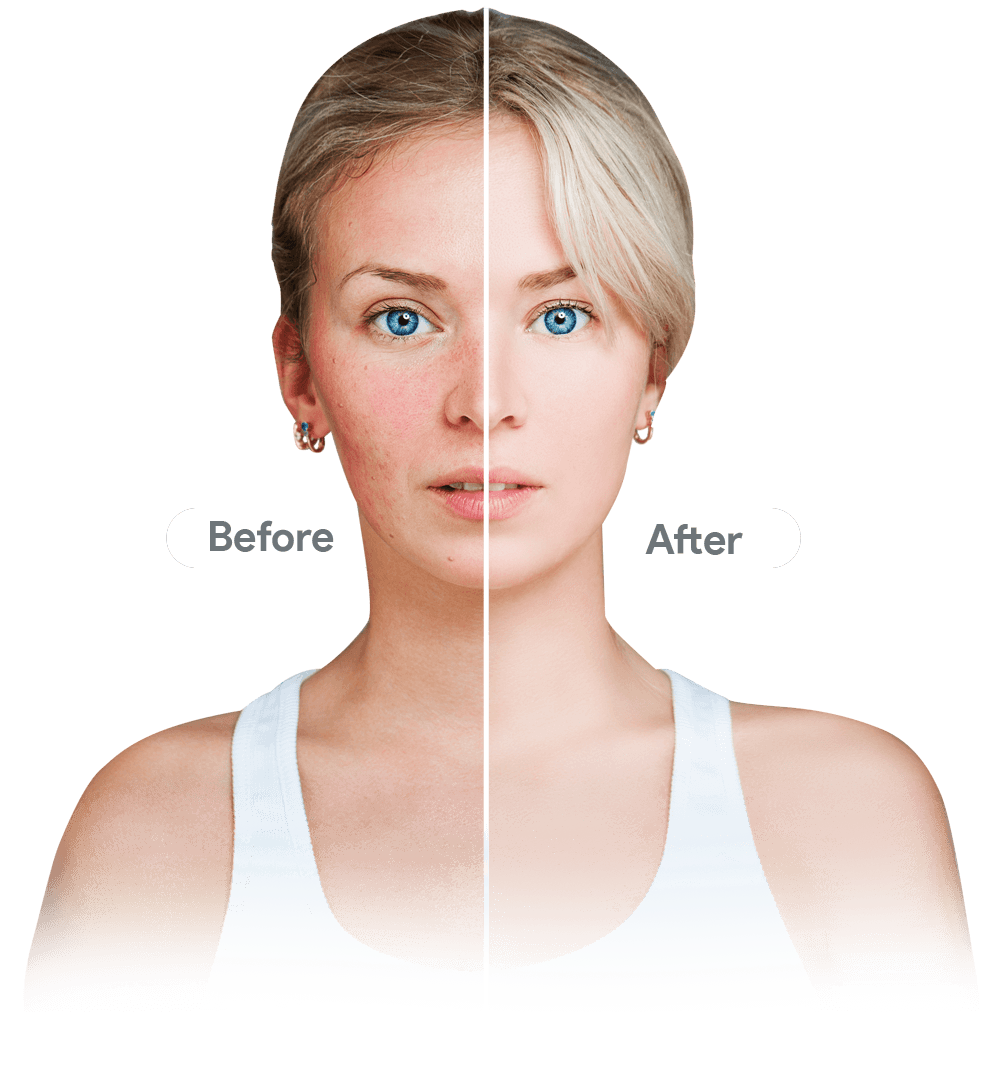
If your complexion is marred by redness, visible blood vessels, or pimples, you could have rosacea. You certainly are not alone – the condition affects the lives of an estimated 415 million people worldwide. Yet because there are many misunderstandings about what rosacea is, it often goes undiagnosed and untreated. Dr. Daniel Achtman and Dr. Carmine McConnell of DSA Dermatology in Plano share their experienced insight.
Dermatologists in Plano explain what rosacea is
Rosacea is a chronic but treatable skin condition that tends to flare up, then go into remission. It primarily presents on the central portion of the face – the center of the forehead and chin, and across the cheeks and nose.
Like many dermatological conditions, rosacea is initially identified through symptoms:
- Flushing or blushing – facial redness accompanied by a sense of warmth
- Pimples – Small bumps that are red and solid or pus-filled
- Facial veins – Telangiectasia are visible
- Diffuse redness – Persistent ruddiness of the complexion
- Plaques – Raised patches of reddened skin
- Uncomfortable sensations – Skin on the face may burn, sting, itch, or feel tight
- Changes in skin texture – Despite oiliness, the skin may be dry, rough, or scaly
- Edema – Facial swelling
- Eye irritation – Itching, watering, or bloodshot eyes; red or swollen eyelids; styles
Anyone, male or female, may develop rosacea at any stage of life. However, it is most common after age 30 in individuals with fair skin tone. Women are more prone to get rosacea, but the condition is often more severe for men.
Medical researchers are working hard to determine the cause of rosacea. Currently, there appears to be a genetic factor – it runs in families, especially in those of eastern or northern European descent. Redness is the body’s inflammatory reaction to an immune system/neurovascular disorder, possibly linked to mast cells which serve as the body’s interface between the nervous and vascular systems. There is also a potential link to Demodex folliculorum, a microscopic mite that lives on human skin.
What we do know is that rosacea:
- Can have a detrimental effect on the patient’s emotional well-being. In surveys conducted by the National Rosacea Society (NRS), 90 percent of respondents said the condition lowered self-esteem, and 88 percent said it had a negative impact on professional interactions.
- Is potentially serious. Ocular rosacea can result in vision impairment and corneal damage. Phymatous rosacea causes the skin on and around the nose to get thick and bumpy, with unusually large pores. Without treatment, significant deformity can develop.
- Outbreaks can be treated effectively, and the condition can be managed long-term. In the NRS surveys, 70 percent of patients reported that medical treatment improved their skin and emotional state.
- Requires accurate diagnosis for effective treatment outcome. The list of symptoms shown above can also be characteristics of many other diseases. For example, rosacea is often misdiagnosed as “adult acne.” An inappropriate course of treatment wastes money delays improvement in skin, and may aggravate rosacea.
Managing rosacea
Once a dermatologist has confirmed a diagnosis of rosacea, the first treatment step is identifying triggers – actions, events, or substances that make symptoms flare-up. Often rosacea symptoms are triggered by sun exposure, wind, or hot or cold weather. Spicy food, alcohol, and hot beverages bring it on for some people. Vigorous exercise, hot baths or showers, fragranced skincare products, certain medications, and emotional stress/anxiety can also be triggers.
The doctor may suggest keeping a journal to note what you ate or did just before a flareup. Then, simple lifestyle adjustments may help to reduce the frequency of rosacea problems.
At DSA Dermatology, medical treatment is tailored to the individual patient. Though rosacea is not a bacterial infection, it sometimes responds to the anti-inflammatory properties of oral or topical antibiotics. Drugs containing sulfur or azelaic acid may be prescribed with or as an alternative to antibiotics. Cardiovascular medication can help to control severe flushing associated with rosacea. Eye irritation is treated with medicated drops and a special daily cleansing routine. Skin thickening may be corrected with traditional or laser surgery.
Laser therapy is very effective in eliminating visible blood vessels and fading diffuse redness. Dr. Achtman and Dr. McConnell use an Nd:YAG vascular lasers to target red pigments in the blood. IPL or intense pulsed light, similar to laser therapy, can also be beneficial in lightening the redness and restoring refined skin texture.
Living with rosacea is easier with the right support team. Get an accurate diagnosis, compassion, and a treatment plan that works with your lifestyle at DSA Dermatology in Plano, TX. Call (972) 362-9567 for a consultation with Dr. Achtman or Dr. McConnell.
Why Choose DSA Dermatology?
At DSA Dermatology, we bring to you the best of not one but three leading dermatologists in Plano TX,



At DSA Dermatology, we bring to you the best of not one but three leading dermatologists in Plano TX, Dr. Daniel S. Achtman, Dr. Carmine G. McConnell and Dr. Jordan. Achtman.
Dr. Achtman is a board-certified Dermatologist with over three decades of experience. Having graduated from the medical school of McMaster University, he also studied at the UTSW Medical Center in Dallas, TX where he also served as Chief Resident in the Department of Dermatology. In addition to possessing extensive training and experience in cosmetic enhancement techniques, Dr. Achtman is widely known as a leading expert in the diagnosis and treatment of various skin cancers. He is an active member of the American Society for Dermatologic Surgery. Dr. Achtman goes the extra mile to understand your medical concerns and to ensure that he helps you meet your unique aesthetic goals.
Dr. Carmine G. McConnell is a board-certified physician in Plano TX. Having been trained at McMaster University, Canada, she went on to earn her board certification in Texas. Having served as Chief of Staff of her department at Plano Medical Center, she has over two decades of experience in practicing medicine in her practice and while assisting Dr. Achtman in the practice of dermatology. In addition to her extensive postgraduate training in laser therapy and aesthetic surgery, among other procedures, she possesses vast experience in both cosmetic dermatological techniques and family medicine. As a conscientious and caring physician, Dr. McConnell provides her patients with customized non-surgical treatments to help address health and aesthetic concerns related to the skin. She is also keen on helping patients understand their skin and how it can be cared for and protected.
Dr. Jordan Achtman is a board-certified dermatologist in DSA Dermatology at Plano, TX. Dr. J. Achtman graduated from the University of Pennsylvania in Philadelphia and completed his residency in dermatology at UT Southwestern. His expertise spans general, surgical, and cosmetic dermatology. Dr. J. Achtman also has various special interests including chronic itch, infectious diseases of the skin, and the relationship between mental health and skin health. He is also very keen on helping patients form healthy skincare regimens and habits. In the hands of Dr. J. Achtman, you can be assured of innovative and cutting edge solutions for all your skin concerns.


